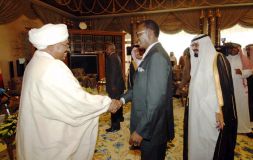Sudan, Chad discuss Darfur, biateral ties
June 3, 2007 (SIRTE, Libya) — Chadian President Idriss Deby and his Sudanese counterpart Omar al-Beshir held a meeting here to discuss Darfur crisis, and the on going normalization between the two countries.
 On the sidelines of the 15 summit of the Community of Sahel and Saharan States (CEN-SAD) Sudanese and Chadian presidents discussed until late on Saturday.Darfur crisis resolution and the normalization of the bilateral relations. This face-to-face meeting was held in Sirte after a four-party meeting between President Omar al-Bashir, Chadian President Idriss Deby, Libyan leader Muammar Gadhafi and Malian President Amadou Toumani Toure.
On the sidelines of the 15 summit of the Community of Sahel and Saharan States (CEN-SAD) Sudanese and Chadian presidents discussed until late on Saturday.Darfur crisis resolution and the normalization of the bilateral relations. This face-to-face meeting was held in Sirte after a four-party meeting between President Omar al-Bashir, Chadian President Idriss Deby, Libyan leader Muammar Gadhafi and Malian President Amadou Toumani Toure.
Foreign Minister Lam Akol said the meeting is a continuation of the last meeting between the four leaders last April, which discussed the situation in Darfur and convincing the Darfur holdout groups to join the peace process.
Akol added that the meeting also discussed bilateral ties between Sudan and Chad and the results of meetings between government officials of the two countries.
It also touched on the plan to deploy troops along the common border and prevent rebels in from both countries from using the border areas. He also pointed out to the visit by President Debby in mid June.
In their closing statement, CEN-SAD heads of state said that “intervention by outside forces could complicate the situation in Darfur,” where a scorched earth response to an ethnic minority rebellion launched in 2003 has sparked US charges of genocide against the Arab-dominated government in Khartoum.
They called on rebel factions that rejected a peace agreement signed in the Nigerian capital Abuja in May last year to “participate in the Darfur peace process as soon as possible.”
They also urged the United Nations to honour its commitment to support an embattled 7,000 strong African Union peacekeeping force in the western Sudanese region that has struggled to patrol a region the size of France.
The world body has reached agreement with the Sudanese government on the first two stages of a plan to bolster the AU force, but UN efforts to replace the existing mission with a robust joint force of up to 23,000 soldiers and police have so far been rejected by Khartoum.
(ST)
